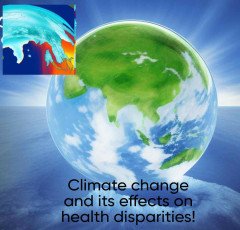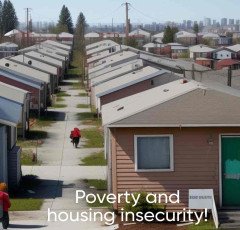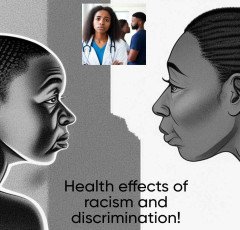
Climate Change And Its Effects On Health Disparities

Long-term modifications to the Earth's climate, such as rising global temperatures, altered precipitation patterns, and more frequent and severe weather events, are referred to as climate change.
The combustion of fossil fuels and deforestation are two examples of human actions that are mostly to blame for these changes.
Health is significantly impacted by climate change, particularly health inequities.
The term "health disparities" describes variations in health outcomes among various groups of people, such as variations depending on race, ethnicity, income, or location.
Health inequities can be made worse by climate change in a number of ways. For instance, extreme weather events like heat waves, storms, and floods can disproportionately harm vulnerable groups including the elderly, persons in low-income areas, and those who have ongoing medical concerns. These occurrences may result in harm, fatalities, and interruptions.
In addition to worsening air and water quality, climate change can significantly raise the risk of cardiovascular and respiratory disorders. Communities of color and low-income groups are frequently overexposed to air and water pollution, which can exacerbate already-existing health inequities.
Food and water shortages brought on by climate change may disproportionately impact vulnerable populations, particularly those living in developing nations. Malnutrition, impaired immune systems, and an increased risk of infectious diseases can result from a lack of access to clean water and nourishing food.
Health disparities are significantly impacted by climate change, especially for disadvantaged groups.
Action must be taken to combat climate change and safeguard everyone's health, especially that of the most vulnerable.
Climate change can affect health inequalities indirectly in addition to having direct effects on health. For instance, the effects of climate change can have a disproportionately negative impact on low-income areas by causing economic disruptions like crop failures and rising healthcare expenditures.
In addition, social inequities including ethnic and economic divides may be made worse by climate change, which may have long-term effects on health. For instance, forced relocation brought on by climate change may disrupt social networks, raise stress, and worsen mental health issues.
To understand that not all groups are equally affected by climate change's effects on health disparities.
People who are already at risk for adverse effects owing to social, economic, or health issues are frequently more vulnerable to such effects.
Reducing health inequities and combating climate change are linked objectives that call for action on many fronts, from personal choices to global regulations. Reducing greenhouse gas emissions, encouraging renewable energy sources, enhancing access to healthcare, and boosting resistance to climate-related hazards could all be strategies to deal with climate change and health disparities.
There are considerable effects of climate change on health disparities, which can exacerbate already-existing social inequalities and cause long-term health issues. The aims of addressing climate change and health inequities are linked and call for coordinated action from several sectors.
Steps can be taken by governments, communities, and people to lessen the effects of climate change on health inequities. These actions could consist of:
In order to effectively manage the effects of climate change on health, communities may benefit from developing greater resilience to climate-related hazards. This can entail assisting community-based adaptation projects, fostering sustainable agriculture, and enhancing infrastructural resilience.
Cooperating internationally: Since climate change is a worldwide issue, international collaboration is necessary to combat it. Together, nations can lower greenhouse gas emissions, prepare for the effects of climate change, and aid vulnerable populations.
A comprehensive strategy that tackles the underlying social, economic, and environmental variables that lead to susceptibility is needed to address how climate change is affecting health inequalities. Action at all levels, from individual actions to global legislation, will be necessary to mitigate the effects of climate change on health inequities.
People may help lessen the effects of climate change on health inequities. People can do a variety of things, like:
Action must be taken at many different levels, from personal choices to international regulations, to address how climate change is affecting health inequities.
Reducing one's carbon footprint and supporting laws that advance sustainability and health equity are both things that individuals can do. We can lessen the effects of climate change on health disparities and build a more sustainable and just future by cooperating.
Must understand that not everyone is experiencing the effects of climate change on health inequities. Despite making the least contribution to the problem, low-income countries and populations are frequently the most vulnerable to the effects of climate change.
International support and cooperation are crucial to addressing this global injustice.
To assist developing nations in making the transition to a low-carbon economy, adjusting to the effects of climate change, and strengthening their resilience to climate-related hazards, developed nations might offer them financial and technical support.
Should give vulnerable populations' needs first priority when developing climate change policies and initiatives. Involving communities in decision-making procedures, ensuring that healthcare and other important services are available and cheap, and advancing social equality and justice are a few examples of what this might include.
A comprehensive strategy that tackles the underlying social, economic, and environmental variables that lead to susceptibility is needed to address how climate change is affecting health inequalities. Action at all levels, from individual habits to global policies, with an emphasis on promoting sustainability, fairness, and justice, will be necessary to mitigate the effects of climate change on health disparities.
To address the effects of climate change on health inequities, research and education are equally essential.
Research can be used to pinpoint the precise health effects that climate change will have on vulnerable groups as well as the best interventions and regulatory measures to lessen these effects.
The promotion of sustainable behaviors and policies through education can help increase awareness of the effects of climate change on human health. This can entail teaching medical professionals on the connections between climate change and health as well as giving vulnerable communities health education.
Research, education, policy, and community involvement are all necessary components of an all-encompassing, interdisciplinary strategy to address the effects of climate change on health inequalities. We can build a more just and sustainable future for everyone if we cooperate.
Health inequities are significantly and broadly impacted by climate change.
A threat multiplier, climate change both exacerbates and generates new health inequities. Particularly at risk are vulnerable groups like low-income neighborhoods, kids, the elderly, and people with pre-existing medical disorders.
A thorough and coordinated strategy that tackles the underlying social, economic, and environmental variables that lead to susceptibility is needed to mitigate the effects of climate change on health inequalities. This can entail lowering greenhouse gas emissions, enhancing public health systems, tackling socioeconomic inequities, encouraging resilience, participating in international collaboration, and assisting individual actions.
It will need a collaborative effort from individuals, communities, governments, and international organizations to address how climate change is affecting health inequities. We can build a more just and sustainable future for everyone if we cooperate.
Undoubtedly, we must all work together to build a future that is more sustainable and just. To lessen the effects of climate change on health inequities, people, communities, and governments can also take the following measures:
A comprehensive strategy that tackles the underlying social, economic, and environmental variables that lead to susceptibility is needed to address how climate change is affecting health inequalities. We can build a more resilient and healthy future for everyone by supporting sustainability, equity, and justice.
To emphasize that a person's actions can be very important in reducing the effects of climate change on health disparities. People can do a variety of things, like:
People can become more aware of the effects of climate change on their health and take constructive action by being educated about these connections.
Everyone must work together to address the effects of climate change on health inequities, including individuals, communities, and governments. We can all benefit from a more resilient and healthy future by taking personal responsibility for our actions and advocating for sustainable behaviors.















 Best Selling Books
Best Selling Books  Hot Bags For Pain Relief
Hot Bags For Pain Relief  Graphics & Design
Graphics & Design  The Secret Email System
The Secret Email System  SEO Checklist
SEO Checklist  Smart Doorbell
Smart Doorbell  ELECTRONIC ACCESSORIES
ELECTRONIC ACCESSORIES  Online Technology Classes
Online Technology Classes  RPM 3.0
RPM 3.0  NordPass
NordPass  Best Sellers On Amazon
Best Sellers On Amazon  Men Clothing
Men Clothing  Hello Theme
Hello Theme  1150+Trendy kids coloring pages Bundle
1150+Trendy kids coloring pages Bundle  SOFAS
SOFAS  Online Marketing
Online Marketing  Creative Brief For Video Shoot
Creative Brief For Video Shoot  Best Home Appliances
Best Home Appliances  Only For The United States
Only For The United States  Unreal Engine 5 For Beginners Learn The Basics Of Virtual Production
Unreal Engine 5 For Beginners Learn The Basics Of Virtual Production  All Wireless Products
All Wireless Products  ASPINAL LONDON
ASPINAL LONDON  Artificial Intelligence
Artificial Intelligence  TitTok Revolution
TitTok Revolution  ASUS Laptop
ASUS Laptop  Acer Laptop
Acer Laptop  Women Fashion
Women Fashion  Best Robotic Vacuum Cleaners
Best Robotic Vacuum Cleaners  NordVPN
NordVPN  Sennheiser
Sennheiser  The Click Engine
The Click Engine  NordLocker
NordLocker  Unlimited access to classes on illustration, photography, design, film, music
Unlimited access to classes on illustration, photography, design, film, music  Top Rated From Amazon
Top Rated From Amazon  Amazon Best Selling Products
Amazon Best Selling Products  BEST SELLER TOP10
BEST SELLER TOP10  One World Collection
One World Collection  Favorite Company (Cuelinks)
Favorite Company (Cuelinks) 
















